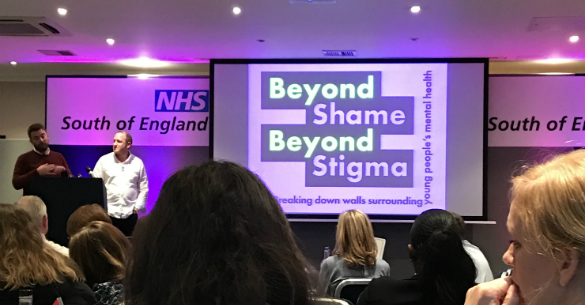
Kay Haughton, our Director of Service Transformation, explores different perspectives on mental health and the enormous impact talking can have on people’s lives.
In 2008, 20-year-old Jonny Benjamin stood on Waterloo Bridge, about to jump. Neil Laybourn, a complete stranger to Jonny at that time, saw his distress and stopped to talk with him – a decision that saved Jonny’s life.
Jonny and Neil now work together campaigning for mental health and suicide prevention. I heard their story at my inaugural meeting with the Mental Health Collaborative last week.
The West of England AHSN, alongside our colleagues in the South West AHSN, sponsor the collaborative, which aims to make care safer by improving quality in mental healthcare.
The study sessions this group delivers are now the stuff of legends and I was really looking forward to my first session. I knew it would be a tough day; the topic was suicide prevention, which I had personally experienced as my brother took his own life in 1993 when he was 27. Michael had schizophrenia and had been unwell for a number of years.
During the latter years of my profession I have been very closely involved in mental health services. I have read many serious incident reports and have often reflected that my experiences have always been depressing.
But I was really looking forward to hear Jonny and Neil speak about their work. They came highly recommended… ‘In my world, the word inspirational gets bandied around a lot, but Jonny Benjamin is truly deserving of that adjective.’ – HRH The Duke of Cambridge.
Jonny and Neil’s work now takes them to schools, hospitals, prisons and workplaces to help end the stigma by talking about mental health and suicide prevention. The overall message is one of hope, especially as during the presentation Jonny told us he had recently relapsed and been in hospital the previous week, and yet there he was sharing his story with such humility and grace.
The South West collaborative had done a great job in securing them as speakers, and Jonny commented on what a well organised conference it was!
Their message is a positive one, and this is the optimism we need to ensure is shared. I wept most of the way through their story and a kind stranger asked me if I was OK. I told her I was fine whilst silently appreciating I realised I didn’t look it!
The truth was I was crying for a number of reasons, sadness at the unnecessary waste of my brother’s life: but more so with happiness that this was an uplifting story, that there is hope for people who think about taking their lives.
Jonny says: “Talking about my illness to other people who suffer as well as my family and friends has been a huge factor in helping me, and hopefully helping others along the way, too.
“We underestimate the value and importance that talking about our mental health has in society, because it can open up a door to a conversation that someone might need. Conversations really can save lives, I am living proof of this.”
Neil describes his contribution as a random act of kindness. This sounds small and yet the impact has been enormous, not just for Jonny but for all the people who have been impacted by the work they now do together. So the take home message for me was ‘It’s OK to talk about mental health’. It really is, and be kind.
All the sessions I attended were well facilitated and presented with the golden thread of quality improvement running throughout them. If you are interested in the work of the Mental Health Collaborative contact sallyashton@nhs.net.
And if you don’t already know Jonny’s story, I recommend you read his book, the Stranger on the Bridge.
Posted on December 5, 2018 by Kay Haughton, Director of Service Transformation, West of England AHSN


